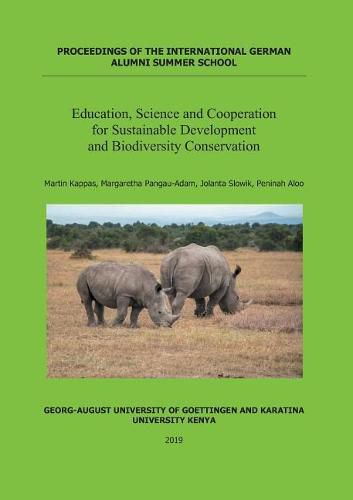Readings Newsletter
Become a Readings Member to make your shopping experience even easier.
Sign in or sign up for free!
You’re not far away from qualifying for FREE standard shipping within Australia
You’ve qualified for FREE standard shipping within Australia
The cart is loading…






The German Alumni Summer School 2018 on ‘Education, science and cooperation between German Alumni for sustainable development and biodiversity conservation in Sub-Saharan Africa’ was jointly organized by the Faculty of Geography-Department of Cartography, GIS and Remote Sensing, the Faculty of Biology and Psychology-Department of Conservation Biology, and the Karatina University, Kenya - School of Natural Resources and Environmental Studies. This summer school was funded by the German Academic Exchange Service (DAAD) and targeted to the German Alumni from Sub-Saharan Africa as well as scientist and experts from various discipline. The European Union being confronted with mass migration from Sub-Saharan Africa is currently working on a new political and economic strategy for Africa. Moreover German Government initiated and proposed a new level of equal cooperation between Africa and western countries in areas such as education, trade, business development and energy. The main idea is to limit the effects of climate change and avoid climate refugees, to prevent mass migration and to help create a future for Africa’s youth’, and underscores the current status and efforts of German development policy towards African countries. Sub-Saharan Africa comprises of 49 states with the highest population growth, and by the end of the 21st century the population is likely to triple. The average economic growth rate for Sub-Saharan Africa countries slowed down from 5.1% in 2010 to 1.4 % in 2016. Africa is still the world’s poorest continent and widespread poverty is the primary cause of malnutrition and health problems. Catastrophes like famines and the recent hunger in Horn of Africa are additionally induced through climate change and land grabbing. Corruption, armed conflict, political and ethnic tension, terrorist activities, unstable state structures, national debt, dependence on global commodities markets, and inequitable world trade mechanisms are mainly responsible for th
$9.00 standard shipping within Australia
FREE standard shipping within Australia for orders over $100.00
Express & International shipping calculated at checkout
The German Alumni Summer School 2018 on ‘Education, science and cooperation between German Alumni for sustainable development and biodiversity conservation in Sub-Saharan Africa’ was jointly organized by the Faculty of Geography-Department of Cartography, GIS and Remote Sensing, the Faculty of Biology and Psychology-Department of Conservation Biology, and the Karatina University, Kenya - School of Natural Resources and Environmental Studies. This summer school was funded by the German Academic Exchange Service (DAAD) and targeted to the German Alumni from Sub-Saharan Africa as well as scientist and experts from various discipline. The European Union being confronted with mass migration from Sub-Saharan Africa is currently working on a new political and economic strategy for Africa. Moreover German Government initiated and proposed a new level of equal cooperation between Africa and western countries in areas such as education, trade, business development and energy. The main idea is to limit the effects of climate change and avoid climate refugees, to prevent mass migration and to help create a future for Africa’s youth’, and underscores the current status and efforts of German development policy towards African countries. Sub-Saharan Africa comprises of 49 states with the highest population growth, and by the end of the 21st century the population is likely to triple. The average economic growth rate for Sub-Saharan Africa countries slowed down from 5.1% in 2010 to 1.4 % in 2016. Africa is still the world’s poorest continent and widespread poverty is the primary cause of malnutrition and health problems. Catastrophes like famines and the recent hunger in Horn of Africa are additionally induced through climate change and land grabbing. Corruption, armed conflict, political and ethnic tension, terrorist activities, unstable state structures, national debt, dependence on global commodities markets, and inequitable world trade mechanisms are mainly responsible for th